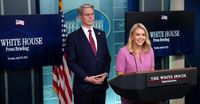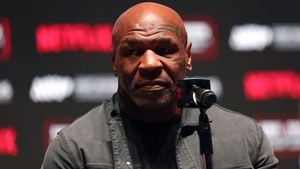On Tuesday, April 29, 2025, tensions between the Trump administration and Amazon escalated when White House press secretary Karoline Leavitt criticized the e-commerce giant's plan to display the additional costs imposed by President Donald Trump’s tariffs on products sold through its platform. Leavitt labeled the move a "hostile and political act" during a press briefing, questioning why Amazon had not made similar disclosures when inflation spiked under the Biden administration.
"This is a hostile and political act by Amazon!" Leavitt exclaimed. "Why didn’t Amazon do this when the Biden administration hiked inflation to the highest level in 40 years?" Her comments were made shortly after reports surfaced that Amazon intended to show customers how much of an item’s cost is attributable to the tariffs, which have significantly impacted the retail landscape.
In her remarks, Leavitt referenced a four-year-old story about Amazon’s alleged partnership with a Chinese propaganda arm, suggesting that this relationship influenced the company's decision-making. "It’s not a surprise because, as Reuters recently wrote, Amazon has partnered with a Chinese propaganda arm," she stated. This rhetoric aligns with the administration's broader narrative advocating for American-made products and onshoring critical supply chains.
Leavitt's comments come at a time when Trump's 145% tariffs on Chinese goods are expected to hit Amazon's business hard, particularly affecting the 60% of its sales that come from smaller, independent retailers reliant on imports. "This is another reason why Americans should buy American," she added, emphasizing the administration's push to bolster domestic manufacturing.
Meanwhile, Treasury Secretary Scott Bessent, who joined Leavitt at the press conference, reiterated that reducing "Biden-flation" has been a priority for the Trump administration in its first 100 days. "Interest rates, mortgage rates are down; gasoline and energy prices are down," Bessent noted, expressing optimism that the administration's deregulation efforts would yield further economic relief by the latter half of 2025.
In a related development, President Trump reportedly called Amazon founder Jeff Bezos earlier that day to express his dissatisfaction with the news report about the company’s tariff disclosure plans. Two sources familiar with the conversation indicated that Trump praised Bezos for his swift response to the issue, stating, "Jeff Bezos is very nice. Terrific. He solved the problem very quickly. He did the right thing. Good guy." This praise came despite the administration's public criticism of Amazon.
Amazon, however, disputed the initial report that it would display tariff costs on its main site. Company spokesperson Tim Doyle clarified that while the team managing Haul, Amazon’s low-cost competitor, had considered listing import charges on certain products, it was never a viable option for the main Amazon platform. "This was never approved and is not going to happen," he confirmed in an updated statement.
The fallout from Leavitt’s comments was immediate, as Amazon's stock took a hit when trading opened on Tuesday. Analysts have pointed to the increasing political pressures on the White House as the effects of its global trade war become more apparent to consumers. A recent Washington Post-ABC News-Ipsos poll revealed that nearly two out of three Americans disapprove of Trump’s handling of tariffs.
Retailers are grappling with the implications of the new tariffs, especially the import taxes on products made in China, which have reached an alarming 145%. Many importers have halted shipments from China, awaiting clarity on trade policies, leading to delays in the delivery of various goods, including appliances and clothing. As Gene Seroka, executive director of the Port of Los Angeles, stated on April 11, "Folks are not shipping out of China right now because they’re not going to pay two and a half times for those goods that are coming in, until we get some semblance of a plan."
Furthermore, the Trump administration's decision to close the "de minimis" exemption, which previously allowed low-cost shipments from China to escape customs duties, is expected to exacerbate the situation. Retail giants such as Walmart, Target, and Home Depot have warned that the continued imposition of tariffs will likely lead to higher prices and empty shelves.
As the administration navigates these challenges, the political ramifications of its trade policies are becoming increasingly evident. The criticism of Amazon's planned tariff disclosure reflects a broader narrative in which the administration seeks to position itself favorably against perceived corporate adversaries. With the economic landscape shifting and public sentiment turning, the coming months will be crucial for both the Trump administration and Amazon as they confront the realities of a turbulent trade environment.
In summary, the conflict between the Trump administration and Amazon over tariff disclosures underscores the complexities of U.S. trade policy and its direct impact on consumers and businesses alike. As both sides prepare for the repercussions of these tariffs, the stakes remain high for the economy and the political landscape heading into the second half of 2025.




